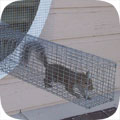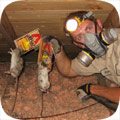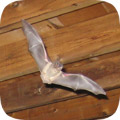- fortmadison@wildlifeanimalcontrol.com
Call 24/7 for a free quote:
319-249-6267
Fort Madison Wildlife Animal Control
Professional Wildlife Removal Company Servicing Fort Madison, IA
If you have a problem with wildlife in your Fort Madison home, your best option is to hire a company that specializes in Iowa wildlife removal only. This is a specialty business, and regular pest control companies do not use the proper techniques to solve animal problems. I have spent many years reviewing Iowa and Fort Madison, and I recommend the following:
Professional Wildlife Removal
Cell Phone: 319-249-6267
NOTE: If you have a dog or cat problem, call Lee County Animal Services: (319) 372-2274

Professional Wildlife Removal specializes primarily in removing animals from attics of homes and buildings - this includes squirrels in attics, raccoons, and rats or mice in homes. Iowa also has a documented problem with
bats in buildings, and Professional Wildlife Removal is specially trained in bat removal. They also perform general wildlife trapping services, such as the capture and removal of skunks or opossums on the
property. Call 319-249-6267 to discuss your critter problem and schedule a same-day or next-day appointment. Click here to learn more about what prices we charge in 2020.
When hiring a company to solve your wild animal problem, you want these features:
- Specializes in wildlife removal, not pest control
- Fully Iowa and Lee County licensed and insured
- Works 7 days per week (critters don't take weekends off)
- Performs full building inspections: enters and inspects attic
- Performs exclusion repairs, with guarantee against animal re-entry
- Offers cleanup of biohazardous wildlife waste
Professional Wildlife Removal is a full-service Fort Madison wildlife removal company. This is very different from a regular Fort Madison pest control company. The pest control companies spray poison to kill insects. This is not at all
similar to wildlife removal. Professional Wildlife Removal performs a full inspection of the home or property, and determines why the animal(s) are there, and if inside a building, how the animals got inside. All
animals (including rodents) are trapped and removed, or if possible, removed from the building using special exclusion devices. Once the animals are gone, preventative repairs are essential, and
cleanup is sometimes recommended.
 Fort Madison wildlife trapping - it's not as simple as it may seem. It's illegal in Iowa to trap without a license. Trap type is very important and there are many different types, bait is somewhat relevant, trap placement
is vital, and there are dozens of small things that are very important to know.
Safety is a concern. Then once the animal is trapped, it must be removed and dealt with in the proper manner according to Iowa law. We offer Fort Madison raccoon removal. Read more about how to get rid of raccoons.
Fort Madison wildlife trapping - it's not as simple as it may seem. It's illegal in Iowa to trap without a license. Trap type is very important and there are many different types, bait is somewhat relevant, trap placement
is vital, and there are dozens of small things that are very important to know.
Safety is a concern. Then once the animal is trapped, it must be removed and dealt with in the proper manner according to Iowa law. We offer Fort Madison raccoon removal. Read more about how to get rid of raccoons.
 Animals in attics - this is our specialty at Professional Wildlife Removal. Many types of animals like to live in attics. This includes squirrels, raccoons, rats, mice, bats, birds, and even possums. Critters like to go into attics for a safe place to live
and raise their young. Removing animals from attics is very complex work, partly because of the presence of baby animals. If you need Fort Madison squirrel removal, we can remove all the squirrels from your attic, and seal out any future ones. Read more about how to get rid of squirrels.
Animals in attics - this is our specialty at Professional Wildlife Removal. Many types of animals like to live in attics. This includes squirrels, raccoons, rats, mice, bats, birds, and even possums. Critters like to go into attics for a safe place to live
and raise their young. Removing animals from attics is very complex work, partly because of the presence of baby animals. If you need Fort Madison squirrel removal, we can remove all the squirrels from your attic, and seal out any future ones. Read more about how to get rid of squirrels.
 Rodent control must be done in a very specific way. First off, the most important thing is that all the openings that rats and mice can use to enter a house be sealed. Then all the rodents must be physically trapped and removed.
Never, ever use poison! Most Fort Madison exterminators will just use this lazy poison technique to kill rodents, and it causes more harm than good - dead stinky rats, and it doesn't solve the problem. Call us for correct Fort Madison rat removal. Read more about how to get rid of rats.
Rodent control must be done in a very specific way. First off, the most important thing is that all the openings that rats and mice can use to enter a house be sealed. Then all the rodents must be physically trapped and removed.
Never, ever use poison! Most Fort Madison exterminators will just use this lazy poison technique to kill rodents, and it causes more harm than good - dead stinky rats, and it doesn't solve the problem. Call us for correct Fort Madison rat removal. Read more about how to get rid of rats.
 Bat removal is a highly specialized task. Iowa is known to have colonizing bats who often live in buildings. Bats love attics. If not removed, the colony can grow to a very large size over the years. The bat droppings are often corrosive and
cause health risks. The same goes for bird droppings on or in buildings. We perform Fort Madison pigeon removal and bird control. But our specialty is Fort Madison bat removal. We remove 100% of the bat colony and seal the building so that it's totally bat-proof. Read more about how to get rid of bats.
Bat removal is a highly specialized task. Iowa is known to have colonizing bats who often live in buildings. Bats love attics. If not removed, the colony can grow to a very large size over the years. The bat droppings are often corrosive and
cause health risks. The same goes for bird droppings on or in buildings. We perform Fort Madison pigeon removal and bird control. But our specialty is Fort Madison bat removal. We remove 100% of the bat colony and seal the building so that it's totally bat-proof. Read more about how to get rid of bats.
 If you have animals inside a house, no job is complete without proper exclusion repairs. If you simply hire a Fort Madison trapper who only removes the critters, then the problem will return. You need to hire a Fort Madison wildlife control company that identifies 100% of the animal entry points
into your building, and seals them shut with professional repairs. In addition, in many cases animals have left waste or contamination behind, and you'll want a company that can provide professional cleaning services. Professional Wildlife Removal does both.
If you have animals inside a house, no job is complete without proper exclusion repairs. If you simply hire a Fort Madison trapper who only removes the critters, then the problem will return. You need to hire a Fort Madison wildlife control company that identifies 100% of the animal entry points
into your building, and seals them shut with professional repairs. In addition, in many cases animals have left waste or contamination behind, and you'll want a company that can provide professional cleaning services. Professional Wildlife Removal does both.
The above are just some of the services offered by Professional Wildlife Removal. We also trap and remove animals that destroy lawns, such as moles, or digging animals. Sometimes animals like opossums will live under buildings, steal pet food, raid garbage cans, etc.
Read about how to get rid of opossums. Skunks commonly live under sheds or decks, and set up a den. We can trap and remove them without them spraying. Read about how to get rid of skunks. Professional Wildlife Removal
also provides dead animal removal in Fort Madison. If you need help with any other wildlife conflict, from a fox, beaver, groundhog, or any other critter, we can solve it. We also do Fort Madison snake removal - most of the snakes in Iowa are not venomous, but
call us if you want safe removal, or read about how to get rid of snakes in Fort Madison. And remember, we are a private business, not Lee County Animal Control Services, so if you have a dog or cat problem, call the County at (319) 372-2274.
Lee County animal services does not handle any wildlife issues.
Professional Wildlife Removal: 319-249-6267
Fort Madison Pricing Info For Year 2020
 Every wildlife removal situation is different, from the species of animals involved, the location of the animal inside a house or outside, the extent of repairs or cleanup, etc. It's impossible to give one-size-fits-all prices. Examples MIGHT include:
Every wildlife removal situation is different, from the species of animals involved, the location of the animal inside a house or outside, the extent of repairs or cleanup, etc. It's impossible to give one-size-fits-all prices. Examples MIGHT include:
Small Job: For example, a one-stop job to remove an animal in the yard: $100 on up
Medium Job: For example, getting critters out of your house with minor repairs: $300 on up
Large Job: For example, a project involving many service trips and complex work: $500 on up
Give us a phone call now and tell us about your wildlife issue and we will be able to give you a price estimate over the phone. If you're cool with it, we can schedule a same-day or next-day appointment if you like. Our prices are fair, and a good value because we do the job right, the first time.
Fort Madison Wildlife Tip #1:
How Do Snakes Make Venom?
How do snakes make their venom? Do not ever store the venom or make them immediately when they want to administer bite on their victim? These are the questions majority of people usually ask when it comes to knowing more about venomous snakes. Snake venom differs from one venomous snake specie to another. Some venomous snake species are more deadly or dangerous than others. A bite from some venomous snakes can kill one without few minutes if nothing is done to neutralize the effect in the blood stream. You are going to find out more about snakes venoms and how they are being made through this post.
The truth about snake venom you should know
Snake venom is produced from the organs that originated from the slivery gland. In a normal way, saliva contains some digestive enzymes that are responsible for breaking down food particles in the absorbable form in the body. But the case of snake saliva is different as it contains more toxic and dangerous saliva responsible for several harms the snake cause. The venoms in the blood stream can really be dangerous and extremely fatal.
How Snake Made Their Venom
How do snakes make their venom? If that is what you are still asking you can stop to ask as the venom is made in a special organ that originated from the salivary gland. The research conducted on the venom of king cobra was proved that venom contains mere proteins. But, when such proteins get into the blood stream of a victim it can be really dangerous and deadly. Snakes usually produce the venom as means of attack as well as defense from the enemy.
The contents of some snake venom
Snake venom varies in their content depending on the particular snake specie under study. The kind cobra venom is known to contain proteins and some other toxic substances. Another thing found in snake venom is zootoxins, which quicken the transportation and digestion of prey in the belly. Snakes normally inject the venom through unique fangs through bite.
Why you should avoid venomous snakes
The fear linked to entire snake species is caused mainly by venomous snakes. Snake venom is so deadly and extremely dangerous that it can result to death without wasting time. So, you should avoid completely coming close to venomous snake. In fact, anything called snake is not good to be approached mainly for those that cannot differentiate between venomous and non-venomous snakes.
Fort Madison Wildlife Tip #2:
Iowa Wildlife Information:
Iowa State bird: Eastern goldfinch
State amphibian: North American bullfrog
State fish: Channel catfish
Iowa is a central state in the Midwest, and its location has given it the nickname "America's heartland". Despite being a naturally flat state which used to have plentiful forests, Iowa has given up much of its natural habitats in favor of agriculture. Now, forests only cover 7 percent of the entire state, often in the river valleys only where farming isn't practical or easy. Thirty percent of the state is still grassland, but only 1 percent of that 30 is original prairie land. More than half of the state-at 60 percent-is active farmland. The weather in this region is warm and humid during the summers with cold, snowy winters. Thunderstorms are common on a daily basis in the warm weather.
Unlike other states with grasslands, Iowa no longer has many of the large grazing creatures that loved to live on the plains. Elk and bison have long since been extirpated from the state due to heavy deforestation and land conversion. Only white-tailed deer remain, and these were once wiped off Iowa soil as well. The species was re-introduced and has thrived, but it is still uncommon in some areas.
Despite the lack of large grazers, predators have fared better in Iowa that in other states. For a while, there was thought to be no evidence of mountain lions or gray wolves, but the large cats have been making a comeback. Experts feel there may now be a breeding population in the state. Smaller predators, like bobcats and coyotes, live off the plentiful small animals that live around the countryside. There are plenty of rabbits, prairie dogs, and raccoons to keep the carnivores happy.
An abundance of small animals means an abundance of pest animals, and Iowa is no exception. The state has raccoons, bats, squirrels, mice, rats, and opossums. Spotted skunks are protected by the state, but they can still become pest animals.
Unfortunately, Iowa has lost many of its native animals due to the progressive nature of humans. A number of animals are on the endangered species list including bald eagles, flying squirrels, bats, certain owls, and a number of lizards, insects, fish, and reptiles. While the original agriculture move ousted many of the state's species, Iowa is taking steps to protect the remaining wildlife.
You can always call Professional Wildlife Removal, any time of day, at 319-249-6267, for a price quote for Fort Madison wildlife control services. I am confident that this is the best choice amongst wildlife removal companies in Fort Madison, IA.





































